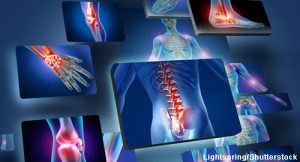 ACR CONVERGENCE 2020—Likening the development of rheumatoid arthritis (RA) to water under the surface of an iceberg, in which what lies beneath is hidden from view, Ronald van Vollenhoven, MD, PhD, chair of the Department of Rheumatology and Clinical Immunology at the Amsterdam University Medical Centers of the University of Amsterdam, The Netherlands, provided an apt visual for a discussion on the etiology of RA and potential treatments to slow, stop or reverse the pathogenesis of preclinical RA before it manifests itself in its more debilitating, active disease form. Presented during the session Resetting Immune Tolerance for the Prevention of RA, Dr. van Vollenhoven joined two other experts to discuss the current evidence on potential pathogenic mechanisms underlying preclinical RA autoimmunity and subsequent active disease.
ACR CONVERGENCE 2020—Likening the development of rheumatoid arthritis (RA) to water under the surface of an iceberg, in which what lies beneath is hidden from view, Ronald van Vollenhoven, MD, PhD, chair of the Department of Rheumatology and Clinical Immunology at the Amsterdam University Medical Centers of the University of Amsterdam, The Netherlands, provided an apt visual for a discussion on the etiology of RA and potential treatments to slow, stop or reverse the pathogenesis of preclinical RA before it manifests itself in its more debilitating, active disease form. Presented during the session Resetting Immune Tolerance for the Prevention of RA, Dr. van Vollenhoven joined two other experts to discuss the current evidence on potential pathogenic mechanisms underlying preclinical RA autoimmunity and subsequent active disease.
“There is a great movement in trying to prevent RA by targeted interventions in the preclinical stage,” said Dr. van Vollenhoven, who also is the director of the Amsterdam Rheumatology Center.
B Cell Depletion: Targeted Therapy?
Dr. van Vollenhoven reviewed research over the past decades that has established the role of anti-citrullinated peptide antibodies (ACPAs) and B cells in the development of preclinical RA autoimmunity. This research, he said, has provided a sound rationale for targeting B cells in the preclinical phase.
He then reviewed clinical results of the PRAIRI trial by Gerlag et al. that looked at whether B cell-directed therapy (or B cell depletion) using a single infusion of 1,000 mg rituximab could prevent RA in at-risk individuals.1 The biologic was not found to prevent RA in the high-risk cohort, but it did delay the onset of disease. Dr. van Vollenhoven suggested the results warrant further inquiry as to understand better why the therapy was not preventive, such as was the treatment not introduced early enough or was the single dose used not sufficiently strong enough?
Dr. van Vollenhoven underscored the importance going forward to improve prediction of which patients are at highest risk of developing RA to justify a treatment trial with bigger results. “The key challenges are identifying the patient who is at high risk and selecting optimal treatment,” he said.
Potential Pathogenic Mechanisms of Preclinical RA
V. Michael Holers, MD, Scoville Professor and head of the Division of Rheumatology at the University of Colorado School of Medicine, Denver, discussed ongoing work through the Studies of the Etiology of Rheumatoid Arthritis (SERA) program at the University of Colorado, examining the factors driving the initiation and development of seropositive RA. He highlighted evidence from multiple independent studies supporting a mucosal site of origin of preclinical RA autoimmunity in at-risk people—sites include the periodontium, intestine, cervicovagina, peripheral blood and lungs.2





